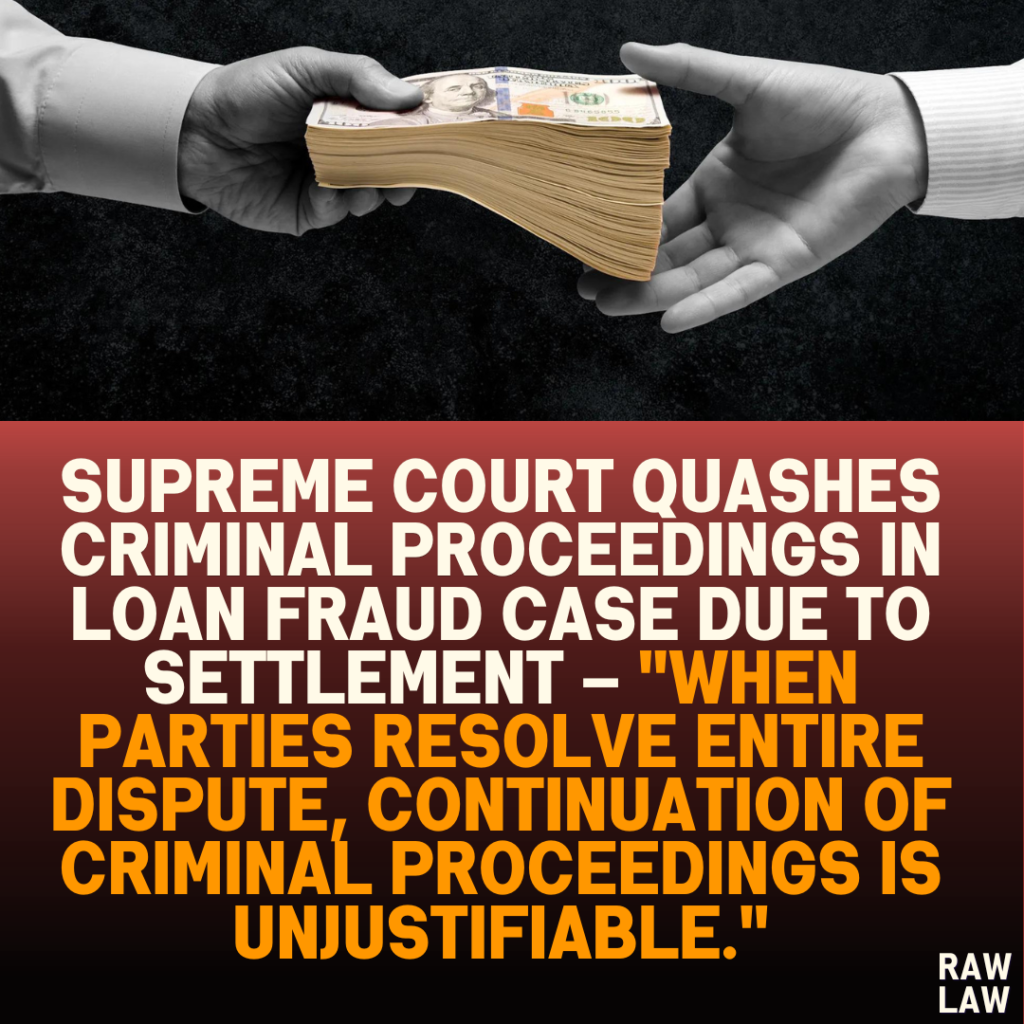Court’s Decision
The Supreme Court set aside the orders passed by the High Court of Orissa and quashed the criminal proceedings pending before the Special Judge (CBI), Bhubaneswar. The court emphasized that when a dispute arising out of commercial transactions has been amicably settled between the parties, continuing criminal proceedings would result in unnecessary prejudice and oppression for the accused. The appellants, being women and having no active role in the conspiracy, were entitled to relief under Section 482 of Cr.P.C.
Facts
The case involved allegations of a fraudulent loan conspiracy involving a bank manager and business partners. In 1998, loans were obtained under suspicious circumstances by two firms – IGPL and Clarion Travels. The appellants were partners in Clarion Travels, while other accused were directors in IGPL. Loans were sanctioned without adequate security and were never repaid, resulting in the registration of a case by the CBI. Eventually, both companies reached a one-time settlement with the bank, fully discharging their liabilities.
Issues
Whether the continuation of criminal proceedings is justified when the accused have settled the dispute with the bank and the loan account has been closed?
Petitioner’s Arguments
- The appellants had no active role in the alleged conspiracy.
- They were dragged into the proceedings solely because they were related to the primary accused.
- A one-time settlement (OTS) had been reached with the bank, resulting in the closure of the loan account, making the criminal proceedings redundant.
- Cited previous judgments where the Supreme Court quashed similar proceedings when a settlement had been reached.
Respondent’s Arguments
- The CBI opposed the quashing of proceedings, asserting that a settlement between the borrower and the bank does not absolve the accused of criminal liability.
- The respondent argued that criminal liability should be pursued irrespective of the settlement reached in the civil matter.
Analysis of the Law
The Supreme Court analyzed the applicability of Section 482 of the Cr.P.C., emphasizing that it should be exercised in cases where the dispute is of a commercial nature and a settlement has been reached. The court underscored the distinction between public offenses and private wrongs, and the necessity of considering whether continuing criminal proceedings would serve the ends of justice or lead to oppression.
Precedent Analysis
The court referred to several judgments, including:
- Central Bureau of Investigation v. Duncans Agro Industries Ltd. – Held that criminal proceedings can be quashed in the event of a settlement in financial transactions.
- Nikhil Merchant v. Central Bureau of Investigation – Reiterated the principle that when the primary grievance has been settled, continuation of criminal proceedings is not justified.
- Gian Singh v. State of Punjab – Recognized the power of the court to quash proceedings when the dispute is private in nature and the chances of conviction are bleak.
Court’s Reasoning
The court emphasized that in cases arising out of commercial transactions, when parties have resolved the matter and there is a negligible chance of conviction, the continuation of criminal proceedings would result in undue harassment. The fact that the appellants were women with no active role in the alleged conspiracy further weighed in favor of quashing the proceedings.
Conclusion
The Supreme Court quashed the criminal proceedings against the appellants, holding that continuing the case would serve no purpose, especially since the loan was settled through the OTS. It emphasized that the High Court should have exercised its power under Section 482 Cr.P.C. to bring an end to the proceedings.
Implications
This judgment reaffirms that in financial and commercial disputes where settlements have been reached, the court should consider quashing the criminal proceedings to avoid unnecessary harassment and prejudice. The decision also sets a precedent for the application of Section 482 Cr.P.C. in similar cases, emphasizing that when the chances of conviction are bleak and the matter is essentially private, the continuation of criminal cases is not justified.



